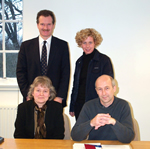Medical Device Governance: Regulation of Tissue Engineering in the United Kingdom and European Union
Abstract
European Union medical device regulations in principle are implemented nationally, but tissue-engineered technologies do not fit into existing formal regulatory organizational structures and definitions, creating, in effect, a regulatory vacuum. In this situation various informal and proto-regulatory activity is taking place. The overall aim of this research is to evaluate the implications of trends in regulation, governance, and evidential processes, in relation to the challenge posed by tissue-engineered medical products (TEMPs). The project will investigate the implications of Temps for existing medical device regulation and healthcare governance, and vice versa. The aim is to develop analytic models for identifying factors which will shape the development of new forms of regulation in relation to innovation, market approval and clinical introduction to Temps, and to evaluate this regulatory activity in terms of implications for healthcare practice, public health and innovation/competitiveness. The boarder governance environment of new medical devices is changing in response to diverse movements including consumer concerns, health technology assessment, risk-based regulation, international harmonization of standards, and cognate sectors such as biotechnology. We propose an approach which will focus upon recent history of medical device regulation and current activity in the UK, upon transnational European forums, and the interface between the two. The project addresses the key IHT Programme issues of the changing nature of healthcare governance, how risks/benefits are determined, and how these processes impact upon the social management of risks/benefits and it links conceptually and substantively to IHT-funded projects on innovation, governance and pharmaceutical regulation.
Summary
Background
Tissue engineered medical products (TEMPs) are a new generation of products combining manufactured materials with animal or human tissues or cells in viable or non-viable form. They are at the centre of an emerging approach to 'regenerative medicine'. These technologies raise regulatory, social, political, economic and public health issues that challenge the existing formal regulatory provisions and the wider governance environment of medical technology and practice. In the EU there are at present no unified regulatory controls for these combination products which lie at the borders of current regulatory classifications (e.g medical device, medicinal product, biologic). There is variation amongst national regulatory bodies in the different regulatory routes that are being applied. In the UK, where a number of such products are already on the market, a code of practice has been produced, while in Europe there have been suggestions that a new dedicated regulatory authority is needed. The aim of this research is to examine the implications of these trends in regulation and governance and the challenge posed by tissue technologies.
Research Design
The objectives of the research are:
a) to map the activity of groups relevant to the regulation of tissue engineering
at the EU level and describe their interface with UK manufacturers, scientists,
regulators, clinicians and patients/citizens;
b) to elicit perceptions and values of these groups regarding the factors
influencing the evolution of TEMP regulation;
c) to survey differences in national regulatory approaches to TEMPs in the
EU;
d) to analyse and compare risk/benefit discourses of constituent groups
as they relate to the 'assessment' of the safety, efficacy, effectiveness,
ethical, legal and social aspects of TEMPs;
The research will comprise extensive documentary analysis, a questionnaire survey of EU regulatory authorities and interviews with regulators, manufacturers, members of standard setting bodies and appropriate EU committees, consumer groups, clinicians and 'tissue engineers'. The study will focus on selected applications of the technology (skin systems, cartilage & bone, vascular prostheses, tissue for reconstruction).
Policy and Academic Implications
The study will contribute to understanding of the key factors influencing the development of new regulatory guidance and legislation relating to tissue engineered medical products. This will be achieved through a systematic analysis of medical device governance from a social science perspective informed by existing work on science and technology studies, regulatory science, risk regulation, pharmaceutical and biotechnology governance. This approach goes beyond the methods of health technology assessment to include a socio-political analysis that sees tissue engineering technology as socially shaped and the processes of innovation and regulation as closely linked.
Contacts
Outputs
Abstract MedSoc 2003 Conference FaulkBSAMedsoc03JK - doc
Abstract BSA Risk & Society Study Group FauklBSAriskPlymouth - doc
Abstract CITER Annual Conference, Aberystwyth FaulkCITER2003AF - doc
Abstract for Finland meeting FaulknerFinlandBiotechConfDF - pdf
BMJ Article May 2003 FaulknerBMJeditorial300503 - pdf
Project Information leaflet FaulknerTERGinfo_leaflet - doc
Abstract for Denmark meeting FaulknerDenmark - doc
Abstract for Murcia, Spain meeting FaulknerMurcia - doc
Abstract for SSHM Summer Conference 2003 FaulknerSSHM_Man2003def - doc
Poster at CITER meeting FaulknerCITER_Posterdef - ppt
News
An Exploratory Workshop on Regulation and Governance of Human Tissue Engineered Products in Europe
The regulation of HTEPs is of international concern and a priority area for EU legislation. There are multiple perspectives from various stakeholders in different EU countries about the potential benefits of these technologies and the implications of what may be regarded as a regulatory vacuum which currently exists.
A workshop that brings together a number of European researchers would assist in identifying the implications of such diverse perspectives. For example a particular concern of industry representatives and regulators is that the absence of regulation is an obstacle preventing access by European citizens to these innovative products, and that it impedes commercialisation and product development. While the market potential for these products is estimated to be large and growing the ability of Europeans to exploit this potential is a key concern.
Information about the current availability of HTEPs is scanty and hard to find, so too is information about products in the pipeline, scientific and clinical work. This workshop could assist in sharing information about what is already known about these technological changes and the policy contexts in different member states. In addition it will be important in developing further research strategies to understand more about what it is at stake here.
Dialogue between a group of researchers will facilitate identification of appropriate research questions, methodologies, and theoretical frameworks for investigation and analysis of regulatory activities across the EU. It may also lead to further collaboration for developing future framework proposals. The aims for the workshop therefore will be:
- To share information about technological changes in the area of human tissue engineered medical products and markets for these products,
- To explore current understandings of regulatory policy as it relates to these products and regulatory activity in this area.
- To identify appropriate analytical and theoretical tools that may be used to analyse regulation and governance of human tissue engineered products in Europe.
- To develop research questions and methodological approaches for further exploration of the relationship between regulation, governance and innovation of human tissue engineering in Europe.
As with the regulation of medical devices and pharmaceuticals the proposed
regulatory framework for human tissue engineered products will be pan- European
and is expected to develop over the next four years. Critical analysis and
understanding amongst the social science communities will only be achieved
if greater attention is focused on these developments. This workshop therefore
will be an important means of promoting such a Europe wide dialogue and
enhancing international collaboration between social scientists already
working in the areas of political science, science & technology studies,
innovation studies, sociology, economics. A report on the workshop will
be produced for dissemination.

